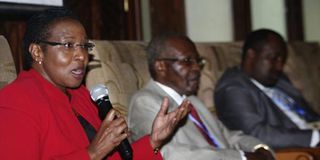Push for public scrutiny of projects

Commission on Administrative Justice vice-chairperson Regina Mwathe addresses the County Executive Committee conference at the Safari Park Hotel in Nairobi on April 14, 2015. With her are Inter-Governmental Relations Technical Committee Chairman Karega Mutahi (centre) and Dr Wario Guyo of JKUAT. PHOTO | EVANS HABIL |
What you need to know:
- Committee members fear current framework is open to abuse.
- MPs urged to pass laws that compel institutions to seek wananchi’s views.
Parliament was on Tuesday urged to strengthen laws to compel public institutions to seek the public’s views before implementing projects.
County Executive Committee (CEC) members said the existing legal framework was open to abuse as some leaders ignored the public, fearing their plans would be discredited.
They said public participation “is poor at the national and county governments due to lack of guidelines on how it should be conducted to capture the views of the people affected by proposed projects”.
CIVIC EDUCATION
The chairperson of the CEC public participation caucus, Mrs Rachel Okumu, called for civic education for the public on the value of their input.
The committee members said there was a need for legislators to come up with guidelines stating the appropriate quorum for such meetings, where they should be held and a reasonable period be allowed for people prepare.
They observed that some people who participated in public hearings did not understand the issues at stake and in most cases, the turnout was low due to poor mobilisation.
Mrs Okumu said most people who attended such public hearings had no clue on what was happening.
“The few who attend might not add value to the matters being discussed,” she said during a devolution forum at the Safari Park Hotel in Nairobi.
Institute for Social Accountability National Coordinator Wanjiru Gikonyo said some leaders got away with it because many county governments did not have a legal framework to support public participation.
“There is resistance, especially from politicians who do not want to be questioned. If you don’t want to be open to the public, your days are numbered,” she warned.
Ms Gikonyo said counties could find ways of getting representation right from the village if they were committed to ensuring the views of the majority were taken into account when making decisions affecting their counties.
The CECs said some public hearings took place in restricted areas such as Parliament, limiting the number of people who could attend.
The constitutional timelines had also made it difficult for the public to be fully involved in issues where their input was required.




